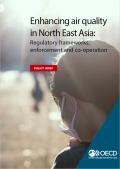This report identifies, classifies, and assesses the relevance of the potential determinants (drivers and barriers) that may explain the use of the cooperation mechanisms of the Renewable Directive 28/2009/EC in the past. The analysis of such historical evidence constitutes a very useful knowledge base to understand the factors that will likely determine the future of renewable energy cooperation in Europe.
The Green Growth Potential Assessment (GGPA) is a diagnostic tool developed by the Global Green Growth Institute (GGGI) that consists of a combination of data analysis and stakeholder consultation in order to identify and prioritise a country’s opportunities for green growth. This report presents the findings of the GGPA for Myanmar. It reviews in detail the challenges and opportunities across a number of sectors, followed by recommendations for each of the green growth priorities.
This report provides a global overview on the progress countries have made in passing laws and regulations that limit the manufacture, import, sale, use, and disposal of selected single-use plastics and microplastics. It is based on a review of national legally-binding instruments that include bans and restrictions, taxes and levies, and waste management measures to enhance disposal, encourage reuse and recycling, and promote alternatives to plastic products.

The Policy Brief - Enhancing air quality in North East Asia presents the key findings from a joint project of the OECD Environment Policy Committee and the Regulatory Policy Committee focused on regulatory frameworks, enforcement and co-operation to address air pollution.
The OECD Principles on Water Governance are intended to contribute to improving the “Water Governance Cycle”—from policy design to implementation.
